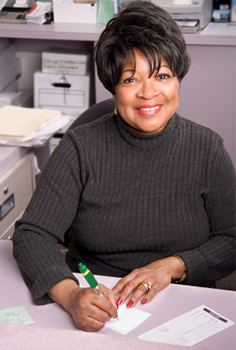
Menopause (which means no periods for one year) is preceded by a transition period of approximately five years referred to as perimenopause. It is often more difficult than menopause itself. If you had children, you may remember how you sometimes felt odd for the first few weeks after delivery due to a drop in hormones. In perimenopause, you experience these hormone highs and lows over and over again. So sometimes you may skip a period or two and notice feelings of warmth, difficulty sleeping, and irritability. Then your period may come again and you feel fine. There is no blood test to diagnose for perimenopause. It is purely diagnosed and treated based on these symptoms. The more you understand what is happening to your body, the better you will do during this time.
Hot flashes
Everyone experiences hot flashes differently, but in general there is an overall feeling of warmth that lasts for several minutes. It can cause sweating, a rapid heartbeat, and feelings of anxiety or panic. Some women have one or two a day, while others may have ten an hour. We recommend avoiding things that make hot flashes worse, such as caffeine, alcohol (especially red wine), and spicy foods. You also may find that hot flashes get worse during periods of stress. Women learn very quickly to dress in layers.
Libido/sex drive
One thing that is not talked about openly is the change in sex drive through this transition. A woman’s libido is very much influenced by the level of the hormone testosterone in the body. As the ovaries stop working in this menopause transition, women lose at least 50 percent of their testosterone production over time. There is no FDA-approved testosterone replacement for women. Studies on testosterone replacement have been disappointing. It requires rather high levels of testosterone to improve libido, and these higher levels may have some risks.
So, even if there is no magic libido pill for women, some other problems can be helped. For instance, many women have vaginal dryness and experience burning with sex. Sometimes even lubricants are not helpful. Prescription vaginal products are available that moisten the vagina and improve its ability to be stretched. Sex is a very mental activity for women. So, if sex is painful, it will affect your libido. Over-the counter arousal creams such as Zestra can be helpful.
Hormones
We used to think that menopause should be treated as a problem and not a natural transition of life. During menopause/perimenopause, the ovaries slowly quit producing estrogen, progesterone, testosterone and other hormones. We had hoped that hormone therapy would keep women healthy without a lot medical problems, but there were risks found to be associated with hormones. Today hormone therapy is viewed as an option to help with menopause symptoms, but we cannot look for hormones to prevent heart disease and stroke; in fact, there may be some increased risks associated with them.
Hormones, which are given as pills, topical patches, and gels, can help hot flashes, sleep disturbances, night sweats and mood swings. In general, it is best to take as little as possible to help your symptoms. There is a wealth of information available at www.menopause.org. Be sure to discuss risks and benefits with your health care provider.
Bioidentical hormones
Patients often times ask about bioidentical hormones that they have heard discussed in the media. Bioidentical simply means that the hormones are produced from a plant source, not synthesized. Produced at compounding pharmacies, bioidentical hormones are not endorsed by the American College of Obstetricians and Gynecologists. We counsel our patients that they can be used, however, all hormones have risks. They are probably safe because they are very low dose, but no large trials have taken place to demonstrate how well they work or provide significant safety information. Also, different pharmacies make different products, and this process is not regulated. For more information, you can go to the following website, www.acog.org and search for “bioidentical hormones.”
Alternative treatments for menopause symptoms
Women who are of normal weight and regularly exercise typically have fewer menopause symptoms. Therefore, consider this your “call” to start eating whole foods and getting daily exercise. However, if you are looking for treatment alternatives, some prescription antidepressants can help. Also, sometimes a sleep aid can be prescribed. Often times a better night’s sleep will improve mood swings and irritability. No herbal product has proven to be effective. Some new studies have suggested that shatavari, or asparagus root, is helpful with menopause symptoms. The website www.menopause.org stays current with many new herbal products.

Weight gain
Many times weight gain is the most bothersome symptom of the menopause transition, as we believe the ovaries produce hormones that affect metabolism. The average menopausal woman will gain 10 pounds through the transition up until age 60. A recent study showed that the only women who did not gain weight through menopause were those who did one hour of intense cardiovascular activity daily. Therefore, menopause is a time when all women have to work hard just to maintain their weight. In addition to a cardiovascular routine, weight lifting also is encouraged to prevent muscle wasting and to maintain bone health. A good website for healthy eating is
www.cleaneatingmag.com. Many magazines such as Oxygen also provide fitness routines for women. Remember, everyone has to work for it now!
All weight loss should be based on both diet and exercise. Any change in eating habits should be something you can continue forever. Studies on dieting by just cutting calories show that eventually the body goes into “starvation mode,” causing the release of hormones that make you even more hungry. This may be part of the reason that people who lose weight often gain in back.
Vitamins
There has not been a study that shows that taking vitamins will help you live longer. What we are realizing from these studies, however, is why certain people may need some vitamin supplementation. The best way to get your vitamins and minerals is through a well-balanced diet.
A woman in menopause should consume about 1200 mg of calcium and 800 U of vitamin D daily. Exposure to ultraviolet light from the sun helps the body make vitamin D, so if you live in an area that does not have many sunny days, you may want to take a supplement. Some women will also need calcium supplementation. The best way to get calcium is through your diet. A helpful guide on calcium-rich foods and osteoporosis can be found from the Centers for Disease Control and Prevention. If you take a calcium supplement, never take more than 600 mg at one time. A good time to take a calcium supplement is with dinner, as the acid from your food helps the calcium get absorbed. Avoid taking calcium with any other medicines.